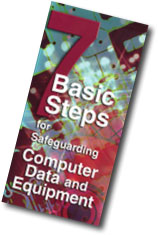Seven Basic Steps for Safeguarding Computer Data and Equipment
 Does your business
rely on computers in its day-to-day operations? If so, ask
yourself this important
question: If you were to have a major computer-related loss,
could your business operate and remain profitable while awaiting
replacement of equipment and restoration of data? Does your business
rely on computers in its day-to-day operations? If so, ask
yourself this important
question: If you were to have a major computer-related loss,
could your business operate and remain profitable while awaiting
replacement of equipment and restoration of data?
No matter how good an insurance
policy may be, no policy can cover every contingency. It is
crucial, therefore, that you adopt loss control procedures
to help safeguard your vital computer data and equipment. Here
are some recommendations:
- Adhere
to file saving/backup procedures
-
Making daily backups of your critical
data and storing them in a
safe place other than your place
of business is a great way
to help ensure that you can
keep your business on track after
a computer related loss.
- Install
an Uninterruptible Power Supply (UPS) - This
temporary battery-powered device can help prevent loss
of data if your computer loses power.
- Obtain
proper surge protection
- Not
all surge protectors are created
equal. Make sure your surge
protector is rated to protect your
computer or other electrical device.
- Implement
virus protection - Install regularly updated
virus protection software. Also restrict the transfer
of software from unprotected computers to your system.
- Develop
and maintain a written basic contingency plan
-
Be prepared with a list of individuals or companies
that could
repair or replace your system and data in the event
of a computer related loss.
- Prevent
unauthorized access to computers - Require a
password to enter your computer system and employ methods
to physically safeguard your computer equipment.
- Install "firewall" software
and/or hardware protection - If you are engaged
in electronic commerce, a firewall can alert you to
unauthorized attempts to access your files from outside
your organization.
The information and suggestions on this page
have been developed from sources believed to be
reliable. However, this advice cannot guarantee
the safety of your computer equipment and data
under all circumstances. The Utica National
companies accept no legal responsibility for the
correctness or completeness of the material or
its application to specific factual situations.
|